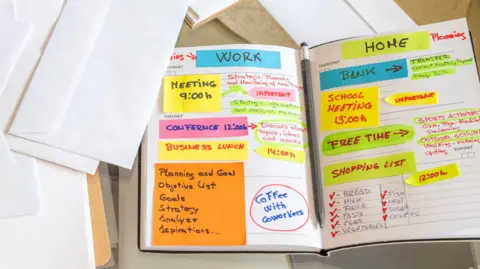 BBC
BBCWhen life gets busy and stress levels rise, it’s not uncommon to find yourself walking into a room and forgetting why you went there, losing your train of thought mid-sentence or struggling to stay focused on simple tasks.
Especially after the weekend, it can be hard to get back into work or study mode.
This mental cloudiness is often called brain fog and while it isn’t a medical condition in itself, it refers to a collection of cognitive symptoms such as difficulty concentrating, forgetfulness, and mental slowness.
Common causes of it can include menopause or perimenopause, but it can also strike when you’ve got too much on your mind.
Medical doctor and Morning Live expert, Dr. Tharaka has these four tips and a special acronym to help cut through the haze.
1. Be kind to yourself
Brain fog can happen to anyone and it’s not a personal failing or a sign that you’re not coping.
Often, it’s simply your brain’s way of saying it’s tired, stressed or overstretched.
Remind yourself that brain fog is usually temporary and it’s okay to slow down, delegate tasks or ask for help when you need it.
If you are concerned then you should contact your GP.
2. Create routines
Reduce decision fatigue by having a set rhythm to your days – a predictable structure can take pressure off your working memory.
Knowing what’s coming next stops your brain from constantly asking, “What am I doing today?”
It’s worth creating a morning and evening routine and even something as simple as laying out clothes or prepping breakfast ahead of time frees your mind from constant decision-making.
3. Take breaks
 Getty Images
Getty ImagesIt’s easy to fill your diary with back-to-back commitments – meetings, social events, errands and daily tasks – without leaving any breathing room.
But constantly jumping from one thing to the next can leave your brain no time to reset, making brain fog more likely.
Try deliberately scheduling short breaks between activities, even just 5–10 minutes to stretch, get a drink, step outside or sit quietly.
Think of these firebreaks like mental buffers: they give your mind a chance to process what you’ve just done, let go of lingering stress and prepare for what’s next.
4. Use calendars and reminders
Trying to hold every appointment, task and reminder in your head can quickly lead to mental clutter and forgetfulness.
Let tech do the remembering for you – use calendars and reminders to free up mental space.
Schedule recurring tasks so they happen automatically – for example, block out lunch in your diary each day or set weekly reminders for bills and chores.
This means you’re not constantly thinking, “What do I need to remember next?”
Swans
 Getty Images
Getty ImagesAlongside these practical daily strategies, Dr T also recommends using his Swans acronym to support brain health and sharpen focus.
Each letter stands for a key habit that can help clear the mental mist and keep your mind performing at its best:
- Sleep: Sleep is non-negotiable – it gives your brain time to rest and consolidate memories. Aim for between seven and nine hours each night.
- Water: Our bodies are about 60% water and even mild dehydration can make you feel unfocused so keep water nearby and sip it regularly
- Activity: Moving your body boosts blood flow and oxygen to the brain, which helps you think more clearly. Try going on short walks, a light jog or regularly stretching
- Nutrition: Nourish your brain with whole foods rather than processed ones. Choline is a nutrient vital for brain health so eating food that is rich in it like eggs, fish and nuts can support concentration and focus.
- Stress: Chronic stress floods the body with cortisol – a hormone that helps regulate your body’s response to stress – and that can cloud your thinking. Find ways to lower stress through breathing exercises, mindfulness and hobbies.
Use the NHS website to find out more about brain fog and how to manage it.
#Brain #fog #easy #ways #fix



